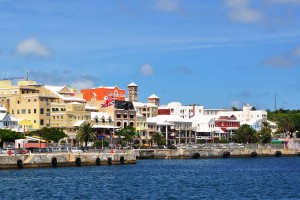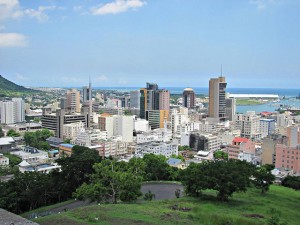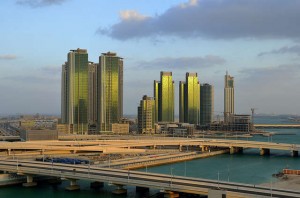Have you ever thought about packing your bags and moving to a sunny island where it’s peaceful all the time, the drinks are cheap, and the taxes are low?
Today we will go through ten offshore jurisdictions and explain the pros and cons of living there.
What is being presented here is not cold hard facts based on meticulous research. Don’t take this post too seriously. I am confident that there will be conflicting information available. Tax information was sourced from reports by the likes of Deloitte and PwC, but may not be accurate. The scoring parameters are wild assessments and started off as notes on a couple of napkins during a particularly tedious flight. There is virtually no consistency.
Images are from various Flickr members. Each picture links to the author’s page.
Bermuda
 Often thought of as a Caribbean island, Bermuda is actually located in the Atlantic Ocean. Its closest neighbour is the USA.
Often thought of as a Caribbean island, Bermuda is actually located in the Atlantic Ocean. Its closest neighbour is the USA.
Once a highly secretive offshore jurisdiction, Bermuda has since taken active steps to increase transparency by weakening banking secrecy and complying with recommendations from organizations like FATF/GAFI and OECD.
Its offshore sector has taken a downward turn but instead its international reputation is getting better.
Bermuda is a sunny paradise island with frequent visits from tourists, mainly Americans.
[ws_table id=”33″]
Cayman Islands
Much like Bermuda, the Cayman Islands have taken serious steps to clean up its reputation in recent years. Once home to highly secretive banks and corporations, it is now a more transparent jurisdiction, which offers a good balance between transparency and privacy. It has been criticized by some for signing an agreement of automatic exchange of information with the UK.
Grand Cayman, Cayman Brac, and Little Cayman offer stunning beaches and scenery, making the Cayman Islands a long-standing tourist hot spot. The tourism industry is a significant source of income for this tax haven.
[ws_table id=”36″]Costa Rica
 I have more than once heard Costa Rica being referred to as the Wild West of Latin America. And I’m willing to agree.
I have more than once heard Costa Rica being referred to as the Wild West of Latin America. And I’m willing to agree.
It’s not that it’s lawless — although it certainly is in some areas; — it’s more about the mentality of the people. Freedom and independence are very important, as are family values and friendships.
Ticos (as the Costa Ricans call themselves) are some of the friendliest people you will ever meet. Once you know enough Spanish to hold even a basic conversation, you will be able to make friends very quickly.
Costa Rica has some of the most beautiful nature and exciting fauna you can find on this planet.
There are, of course, also tax advantages to living in Costa Rica.
[ws_table id=”35″]Gibraltar
Affectionately called The Rock, Gibraltar is a proud British Overseas Territory and a source of great anger with certain parts of the Spanish population.
Gibraltar is a major jurisdiction for import and export as well as financial services and igaming (internet gambling).
After criticism of an unfair corporate structure with zero tax for non-resident companies, Gibraltar changed its corporate law and its reputation and, thus, number of new companies formed in Gibraltar has risen dramatically.
[ws_table id=”34″]Hong Kong
 A true metropolis, Hong Kong is the melting pot of Asia, with a large dose of western influence. This skyscraper jungle has everything to offer, with a population that is proficient in English and with straight-forward residency and work permit rules.
A true metropolis, Hong Kong is the melting pot of Asia, with a large dose of western influence. This skyscraper jungle has everything to offer, with a population that is proficient in English and with straight-forward residency and work permit rules.
Corporate tax rates vary from 0% to 16.5% depending on turnover, corporate structure, and operations. Sales tax does not exist. Income tax is capped at a maximum of 17%.
Hong Kong is one of the largest hubs in the world, with flights to most corners of the world on a daily basis. From the grand and spacious Hong Kong airport, you are rarely more than one layover away from anywhere in the world; often just a direct flight.
[ws_table id=”26″]See also Jurisdiction spotlight: Hong Kong and Macau.
Malta
A sunny, peaceful island in the middle of the Mediterranean fixed between Sicily and Libya, Malta is home to a clever but complicated tax regime which has nurtured significant foreign investment over the last few decades.
The population is very friendly and easy-going. Striking up a conversation with a stranger is perfectly acceptable and you will find that the nearly everyone is able to speak to you in fluent English with the distinct Maltese accent.
Malta isn’t for everyone. Some expats eventually want to go live in a big city or a country with a more variable landscape. Those who like it there stay for very long, though.
[ws_table id=”27″]See also Jurisdiction spotlight: Malta.
Mauritius
 Another sunny and peaceful island, although this time in the Indian Ocean, Mauritius is the home to sugar plantations, clever offshore financial sector, and a lot of tourists. It can also boast about its long political stability, nearly unparalleled in Africa.
Another sunny and peaceful island, although this time in the Indian Ocean, Mauritius is the home to sugar plantations, clever offshore financial sector, and a lot of tourists. It can also boast about its long political stability, nearly unparalleled in Africa.
Living here is a lot like living on a paradise island. It’s remote and small, but it’s also sunny most of the time and life can be enjoyed at a slow pace and low price point.
Taxes are low, the locals are friendly, and the country is growing in numerous sectors. The cuisine is a wonderful blend of African, Asian, Europe, and indigenous Creole. Some of the finest world’s rum outside of the Caribbean is distilled here.
[ws_table id=”29″]See also Jurisdiction spotlight: Mauritius.
Panama
Beautiful on both coasts with a magnificent jungle in between, and a mix of modern cities and rustic villages in between, Panama is as much a tourist destination as it is an offshore financial center.
The country has made significant improvements since the ousting of Noriega. It is today one of the wealthiest nations in South America, and only contested by Uruguay in terms of ease of integration and assimilation for foreigners.
[ws_table id=”32″]Singapore
 Cleaner and more expensive than the already quite clean and expensive Hong Kong, Singapore year after year wins The World Bank’s Ease of Doing Business ranking.
Cleaner and more expensive than the already quite clean and expensive Hong Kong, Singapore year after year wins The World Bank’s Ease of Doing Business ranking.
Moving here is no easy task but once you’ve secured your residence in Singapore, chances are you will enjoy it very much.
[ws_table id=”31″]Switzerland
A safe and beautiful country with low to medium tax rates, home to some of the most stable banks in the world.
The Swiss have a well-deserved reputation for precision, quality, and punctuality. At the risk of sounding like a tourist brochure, the country run likes clockwork. This is something the Swiss themselves may not notice but take it from someone with a lot of international experience.
It’s an expensive country, but you get your money’s worth.
[ws_table id=”28″]UAE (Dubai, Abu Dhabi, RAK)
 A country of contrasts. UAE is at times a conservative Muslim country and at times a bohemian paradise bordering on decadence. There is significant difference between the emirates and even cities within the emirates.
A country of contrasts. UAE is at times a conservative Muslim country and at times a bohemian paradise bordering on decadence. There is significant difference between the emirates and even cities within the emirates.
While Dubai is the shopping and party capital, Abu Dhabi boasts a stronger economy, and Ras al-Khaimah (RAK) offers attractive non-resident/offshore companies. There are also numerous free-trade zones (FTZ) to consider.
Many foreigners who go to Dubai end up finding the city too intense. Abu Dhabi offers are more down-to-earth environment but is also more conservative which may clash culturally with some foreigners.
[ws_table id=”30″]
Others
You will notice that some jurisdictions are missing, such as Belize and The Seychelles. That is because they are not places even worth considering living in. Belize has huge problems with poverty, corruption, and crime.
It is however quite easy and cheap to obtain Belize residency. You have to renew it monthly and twice a year, you must leave the country and return no earlier than 24 hours after departure. Belize can be tolerable in the cayes, but life there is remote and expensive.
The Seychelles is expensive to live in and the taxation is high for residents, with little to no room for optimization. It is also less financially stable than for example Mauritius.
The world is full of interesting places to live. This was just a list of some of them.
Final points
The scores shouldn’t be seen as a ranking. Malta getting the highest score doesn’t mean much if you are the type of person who enjoys a big city feeling and nature, just like UAE’s (relatively) low score is no indication of it being a bad place to be.
Many thanks for a great service – always a fascinating read.
I’m a UK citizen that day trades the US markets. Where can I travel to that treats this as income earned from abroad and zero rates it (or has low rates) as opposed to liability being based on where I am physically? If my broker is in the US is the deal considered as done there or is it where I click the mouse? I remember reading years back how deals done in London were booked offshore using trusts but I don’t know if that would help me.
Hey,
What about small islands in Europe, what are the options?
Canary islands are needing Spanish passport or EU passport which I do not have.
Anything else?
All the small European islands are EU members or have high but not insurmountable capital requirements. Isle of Man, Guernsey, and Jersey might be worth taking a closer look at.
Otherwise, I think we are left with only Northern Cyprus, Turkey’s little puppet state. Taxes are low and getting a permit to stay there is easy, I’m told. The problem is that it isn’t internationally recognized territory. But it’s not EU. At least, EU law means nothing there. Turkey decides what goes on.
Hey Streber,
Thanks for the answer,
What do you think is the best place to get residency for Israelis?
Seems that getting in to Europe is very complicated, I thought about Panama / DR – Any other suggestions?
Hi shawarma,
I’m afraid I can’t really answer that one either. There are far too many parameters that go into such a decision. Advantages sought, available funds, language/culture restrictions, distance to home country, political/geographical stability, personal preferences, and so on. It’s something you’re better off discussing with an adviser who can dedicate hours to researching the matter and use past experience.
There is also a lot of information available on the internet of course. Many jurisdictions have programmes (run by the government and/or consortium of private actors) meant to attract foreign investors. These programmes’ websites typically have quite in-depth information about requirements on setting up a business and moving there. Some examples I happened to have available:
http://www.investcyprus.org.cy/
http://www.investmauritius.com/
Best of luck!
Hey Streber,
Can you please advise on Dominican Republic?
I understand its tax heaven , and very nice place to leave
Also getting residency is very easy
I would like to hear your comments,
thanks
Hello shawarma,
I unfortunately don’t have enough experience on Dominican Republic to write about it at this point.
This may change in the future but for now I’m not the right person to comment on the Dominican Republic.
I hope you find the answers you seek!
Hi Streber,
you’re an unlimited source of inspirations 😉 thank you .
What do you think about the Canary Islands? I know its not exactly offshore since its tecnically spain, but still its a gorgeus place and for EU people might be a good compromise.. easy to reach, easy to settle in.. almost everyone speak english and the life is cheap.
Hi taxlord,
Thanks for your kind words!
I have never really spent any significant time in or researching Canary Islands, but I know of a couple of people who seem to enjoy life there and run companies in the ZEC. I can’t comment on the tax situation.
One risk to consider is that Spain has very shaky finances at the moment with no solution in sight. Countries with subnational tax havens typically leave the tax havens alone even in times of financial turmoil, but Spain is a type of country I would consider to have a non-insignificant risk of stepping in and trying to get more tax revenue. Not saying that it will happen – just that it’s a risk I’d consider.
It’s definitely a jurisdiction/territory to consider. The list above could have been much, much longer.
Thanks for that information, it helped me getting more interested in Malta.
What I understand is that the 35% taxation can be credited for 6/7 (5% effective rate) when paying out dividends to a foreign entity. So if I make 100.000 a year I will have an effective tax of about 5000 euro (if all profits are transferred outside of Malta in a no tax holding).
“Only income remitted to Malta are subject to taxation, meaning you can own offshore investments and not pay a dime in tax.” that’s what you said in your Jurisdiction spotlight of Malta. Do you think this will be the case in this situation? If so how could I use the money freely in Malta? By not paying everything out to the foreign entity? But then I will be taxed at 35%..
If you remit the funds to Malta, it may become subject to some tax. The tax rate depends on how you pay yourself (income/salary, dividends/interest) and how high the amounts are, which is why you would need a local adviser to help you out and set up the best structure possible.
The quote you refer to is regarding living in Malta but not remitting income to Malta. You can live in Malta and run an offshore business with no tax liability as long as the proceeds from the offshore business is never remitted to Malta. If you want to use the money for the company, it needs to be done outside of Malta to not be subject to Maltese tax.
Hi, Streber! Thanks again for this information. Myself am looking at relocating to another country in Europe. So I’d like to stay nearby (Belgium).
Lately I have been thinking about Sofia/Burgas in Bulgaria, Malta or Budapest. I am most interested in Budapest because of their 10% corporate taxation, low cost of living, nice living and low salaries. At the other end Bulgaria is even cheaper but I think nothing will compare to Budapest for nice living.
Malta is probably the most expensive in cost of living of my 3 choices, however still ‘cheap’ for west-euro standards. The wide English speaking is definitely a plus in Malta. You mentioned Malta has a fairly complicated tax code, but I still have to see why having a Malta company is cheap when they have a 35% corporate taxation?
Am I correct that Malta has no transfer pricing rules?
I will be having a resident company in whatever country I will be residing. And probably also a non resident company for passive income.
Hi Balboni,
Thanks for your comment!
The Maltese tax code is complex when it comes to running a business. 35% corporate tax is among the highest in the world but if you structure your company correctly, you can get massive rebates and pay an effective tax rate of as low as 0% but usually 4 – 5%. Such a structure will involve a holding company. Greatly simplified, the 35% tax rate that the company pays can be used as tax credit when profits are distributed to shareholders. This is a very clever piece of legislation and Malta is – as far as I know – unique in how its tax code is written.
You are correct in that there are no transfer pricing rules in Malta. There are also various other tax exemptions. To make the most of Malta, a good tax adviser is required.